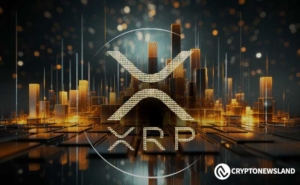XRP’s Regulatory and Institutional Path to Dominance
- XRP's 2025 SEC settlement resolved legal uncertainty, unlocking institutional adoption with $1.2B ETF inflows and 300+ banks using its cross-border payments. - XRP's $0.0002 fees and 1.5M daily transactions outperform Bitcoin/Ethereum's higher costs, driving 300+ financial institutions to adopt Ripple's ODL service. - Analysts project XRP could reach $5.25 by 2030, surpassing Bitcoin/Ethereum due to regulatory clarity, institutional momentum, and real-world payment utility. - XRP's $1.1B institutional pu
The cryptocurrency landscape is undergoing a seismic shift as regulatory clarity and institutional adoption converge to redefine market dynamics. XRP , once mired in legal uncertainty, has emerged as a compelling contender to outperform Bitcoin and Ethereum by 2030. This transformation is driven by a landmark SEC settlement, surging institutional demand, and XRP’s unique utility in cross-border payments.
Regulatory Clarity: A Catalyst for Institutional Adoption
The resolution of the SEC v. Ripple case in August 2025 marked a watershed moment. By affirming XRP as a utility token in secondary markets, the settlement removed a critical regulatory overhang, unlocking institutional access to the asset [1]. This clarity has already spurred a surge in adoption: Ripple’s On-Demand Liquidity (ODL) service processed $1.3 trillion in transactions in Q2 2025, with 300+ financial institutions leveraging XRP for low-cost, high-speed settlements [2]. The ProShares XRP ETF, launched in July 2025, attracted $1.2 billion in assets under management, while 11 additional spot ETF applications are pending, with an 84% approval probability [3]. Analysts project $5–$8 billion in new capital inflows from ETFs alone, further solidifying XRP’s institutional credibility [4].
In contrast, Bitcoin and Ethereum have enjoyed more stable regulatory environments. Bitcoin’s decentralized nature has shielded it from similar legal scrutiny, while Ethereum benefited from the U.S. GENIUS Act’s stablecoin framework [5]. However, XRP’s post-settlement momentum has allowed it to reclaim its position as the third-largest cryptocurrency by market cap, a feat unmatched by its peers in 2023–2025 [6].
Real-World Utility: XRP’s Edge in Cross-Border Payments
XRP’s value proposition lies in its practical application. Ripple’s XRP Ledger (XRPL) processes 1.5 million transactions daily, with average fees of $0.0002—far lower than Bitcoin’s $1.35 and Ethereum’s $2.80 [7]. This efficiency has made XRP a preferred tool for banks in high-cost corridors like UAE-India and Japan-Philippines, where it reduces transaction fees from 5–7% to 0.0004% and enables near-instant settlement [8]. Ripple’s RLUSD stablecoin, backed by BNY Mellon, further enhances liquidity, while the XRP Ledger’s automated market maker (AMM) functionality deepens institutional-grade trading [9].
Bitcoin and Ethereum, meanwhile, remain more abstract assets. Bitcoin’s role as “digital gold” and Ethereum’s staking yields cater to institutional portfolios, but neither offers the same tangible utility in global financial infrastructure [10]. Ethereum’s dominance in DeFi and NFTs is undeniable, yet its real-world payment adoption lags behind XRP’s cross-border traction [11].
Institutional Momentum: A Race to $30?
The institutional adoption race is heating up. By 2025, XRP had attracted $1.1 billion in institutional purchases, with projections suggesting a $50 billion market cap by year-end [12]. If XRP ETFs gain approval by October 2025, the asset could see $8.4 billion in inflows, mirroring Bitcoin’s 2024 ETF-driven rally [13]. Analysts project XRP’s price to reach $5.25 by 2030, with aggressive forecasts hitting $48 or even $100, contingent on continued adoption and macroeconomic tailwinds [14].
Bitcoin and Ethereum, while still dominant, face headwinds. Bitcoin’s price targets range from $135,000 to $458,000 by 2030, but its growth is constrained by supply scarcity and limited utility beyond store-of-value [15]. Ethereum’s price is expected to climb to $47,066, driven by DeFi and tokenized real-world assets, yet its reliance on staking and speculative demand leaves it vulnerable to market volatility [16].
Conclusion: A Strategic Buy for 2030
XRP’s regulatory resolution, institutional adoption, and real-world utility position it as a high-conviction play for 2030. While Bitcoin and Ethereum will remain cornerstones of the crypto market, XRP’s unique role in global finance offers a path to outperformance. For investors, the current alignment of catalysts—regulatory clarity, macroeconomic tailwinds, and institutional demand—presents a rare opportunity to capitalize on XRP’s trajectory.
Source:
[1] SEC and Ripple End Appeals, Closing Landmark Crypto Case
[2] XRP's Institutional Credibility and Post-SEC Legal Clarity
[3] XRP's 2025–2030 Price Trajectory: Is Now the Time to Position for Institutional-Driven Growth
[4] XRP News Today: Regulators' Timeline May Decide XRP's Big Move
[5] Ethereum vs. XRP in 2025: A Strategic Deep Dive into Institutional Momentum and Regulatory Realities
[6] XRP Price Outlook in 2025: Key Catalysts, Trends, and
[7] XRP Statistics 2025: Market Insights, Adoption Data, etc .
[8] XRP's Resurgence: How Regulatory Clarity and Institutional Adoption Are Shaping a New Era for the Digital Asset
[9] XRP's 2025–2030 Price Trajectory: Is Now the Time to Position for Institutional-Driven Growth
[10] Ethereum, Bitcoin, and XRP: Key Price Levels, Institutional ...
[11] XRP's Path to Outperformance: How Technical Strength ...
[12] XRP's Institutional Adoption and Derivatives Milestone
[13] XRP News Today: Regulators Greenlight XRP's Move
[14] Forbes Shares XRP Price Timeline for the Next 5 Years
[15] Bitcoin's Institutional Buying Amid Broad Distribution
[16] Ethereum's Institutional Ascendancy: Market Concentration ...
Disclaimer: The content of this article solely reflects the author's opinion and does not represent the platform in any capacity. This article is not intended to serve as a reference for making investment decisions.
You may also like
Fed Opens Up Direct Payment Pathway for Cryptocurrency Firms
In Brief The Fed introduces a new payment model for cryptocurrency firms. Waller's proposal emphasizes narrow banking for stablecoin issuers. The plan balances regulatory, liquidity, and competitive aspects.

XRP Eyes $2.90 Breakout as Ripple’s Prime Strategy Sparks Bullish Momentum

SHIB Struggles to Stay Afloat as Selling Pressure Mounts — What Next for Shiba Inu?
